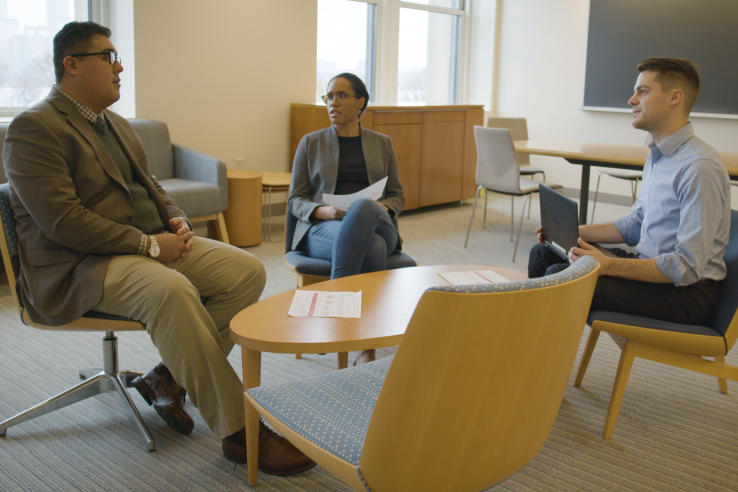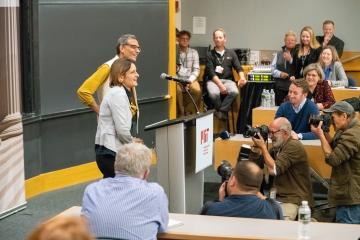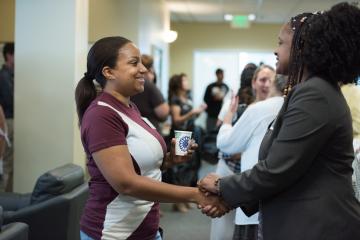
New year, new partnerships to scale life-changing programs

In recent years, the United States Internal Revenue Service (IRS) redesigned the reminder notification letters that now reach more than 360,000 individuals eligible for the earned income tax credit (EITC), giving them millions of dollars in earned benefits. This change was in response to a randomized evaluation which found that follow-up mailings to people who failed to claim the EITC ($26 million in forgone benefits) increased responses by 32 percent. The increase was equivalent to $4 million in EITC benefits being claimed as a result of these mailings. According to the Tax Policy Center, if treated like earnings, the EITC would be the single most effective anti-poverty program for working-age individuals, lifting 5.8 million (including 3 million children) out of poverty. This study, conducted by J-PAL affiliated researchers, Saurabh Bhargava (Carnegie Mellon University) and Dayanand Manoli (University of Texas, Austin), in partnership with the IRS, demonstrates how research partnerships can meaningfully improve the lives of those experiencing poverty.
Poverty in North America can seem insurmountable, but examples like the one above show us that it doesn’t have to be. J-PAL’s Nobel Prize-winning cofounders, Abhijit Banerjee and Esther Duflo, and longtime affiliate, Michael Kremer, have shown us how we can gain insight into complex, seemingly intractable issues through randomized evaluations. Testing questions using this rigorous, experimental approach can then show us which programs and policies meaningfully improve peoples’ lives. And by working closely with state and local governments and implementing organizations, we can bring these key lessons to scale.
Governments across the country have demonstrated an appetite for addressing current policy issues through rigorous research; since 2015, nearly eighty state and local agencies have expressed interest in answering their pressing questions through randomized evaluations conducted with our network of affiliated researchers. With their intimate knowledge of the pressing issues faced by their constituents, government leaders can effectively identify knowledge gaps to address through rigorous research. And by working with the boots on the ground, we have the opportunity to address timely questions that affect current policies and to take positive results to scale. In 2020, we will build on our momentum in catalyzing rigorous research by strengthening existing and developing new partnerships with state and local governments and innovative implementing organizations.
We are incredibly excited about the work we’ve already launched in partnership with government agencies, spearheaded by policymakers seeking to improve the lives of individuals and communities they serve. In King County, WA, J-PAL affiliated professors and the Department of Community and Human Services are working together to test homelessness prevention efforts under a voter-approved initiative. The City of Philadelphia is measuring the impact of summer youth employment programs ahead of the Mayor’s proposed expansion of the program. The California Department of State Hospitals is working with J-PAL affiliated researchers to evaluate its new jail diversion program that will divert participants out of the criminal justice system and into wrap-around community treatment services. In 2020, we look forward to testing scalable solutions that address issues related to poverty with governments and implementing organizations across a range of sectors, including housing and homelessness, criminal justice, and the work of the future.
Our goal is to have effective programs reach more students like Donald, a high school senior in New York City who passed his Math Regents Examination with the help of Saga Education, a non-profit that provides personalized tutoring for students. As Arne Duncan, US Secretary of Education, said, “If we can [expand this tutoring approach] for the school and for the city and around the country, we are going to have a lot more kids be successful.” Like Saga Education, Ready4K!, a technology-based intervention developed by ParentPowered, also has the potential to benefit many more children if scaled. One randomized evaluation tested the impact of Ready4K!’s text message reminders to parents containing literacy-related tasks and found a 0.15 to 0.29 standard deviation increase in parental involvement. Through partnerships with organizations like Saga Education and ParentPowered, we hope to improve many more lives of those experiencing poverty in North America.
Finally, our work would not be possible without the support of our broader community. Join us in our mission to reduce poverty by ensuring that policy is informed by scientific evidence. Below are a couple of ways in which you can get involved:
- Let us know about an innovative program a government is running.
- Connect us to a program run by an implementing organization working to meaningfully improve the lives of people experiencing poverty.
- Enroll in J-PAL and MIT’s Data, Economics, and Development Policy MicroMasters Program.
- Take a deep dive into running a randomized evaluation through our Evaluation Toolkit.
Thank you to all who have joined us in our mission to improve the lives of those experiencing poverty in North America. Our work would not be possible without your partnership.


